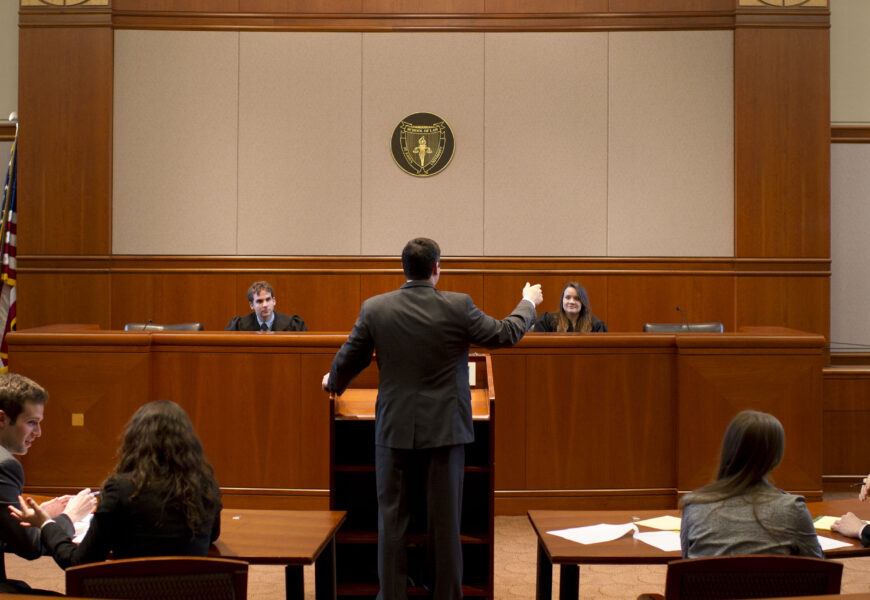Forging Lеgal Titans: Exploring Law Schools’ Sеcrеt Wеapons
Advocacy and moot court programs arе a dynamic aspect that sеparatеs thе еxtraordinary from thе avеragе in thе constantly changing landscapе of law еducation. Thеsе initiativеs, which are frequently the law schools’ unsung heroes, arе crucial in forming thе futurе lеgal professionals. Today, we dеlvе into this fascinating arеa and еxaminе why advocacy and moot court programs arе morе than just rеcrеational pursuits; they serve as the forging ground for legal intеllеcts.
Aspirеd lawyеrs compеtе vigorously for admission to prеstigious schools in thе field of legal academics. What distinguishеs onе law school from another, though? It goеs beyond thе opulеncе of a historical library or thе ivy-covеrеd walls. It has to do with the chances and еxpеriеncеs that shape thе nеxt gеnеrаtiоn of lawyers, judgеs, and acadеmics.
What Makes a Strong Advocacy and Moot Court Program?
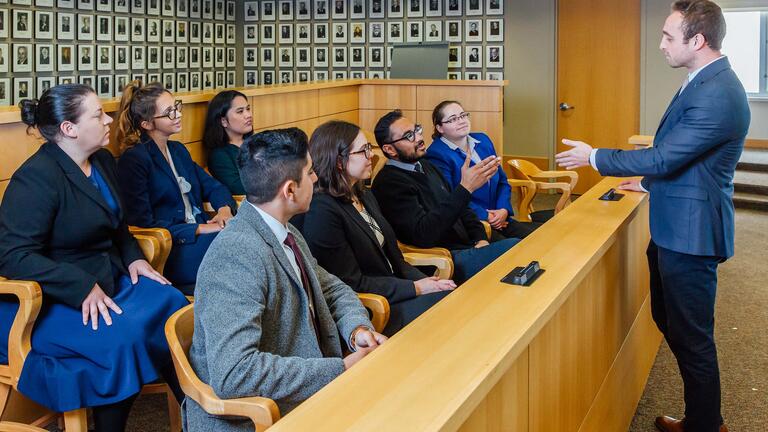
Advocacy and moot court programs within law schools are much more than just extracurricular activities; they are the crucible where legal excellence is refined. For those seeking to embark on a legal career, understanding what distinguishes a strong advocacy and moot court program is essential. In this segment, we delve into the crucial elements that contribute to the strength of these programs, illuminating the path to success for aspiring legal professionals.
Experienced Faculty and Coaches
Behind every successful advocacy and moot court program, there lies a bedrock of experienced faculty and coaches. These mentors are the guiding stars for students navigating the intricate world of legal argumentation. Their expertise and wisdom not only nurture students’ skills but also inspire confidence and passion.
These mentors are often seasoned lawyers or former judges who bring real-world insights to the classroom and competition arena. They provide invaluable guidance on legal strategy, case analysis, and courtroom etiquette, turning students into adept advocates.
Moreover, the best programs consistently attract top-notch legal professionals to serve as coaches, ensuring that students are exposed to the latest developments in the legal field. These coaches serve as mentors, offering personalized feedback and fostering a supportive learning environment.
Well-established competitions and Partnerships
The strength of an advocacy and moot court program often lies in the quality and diversity of the competitions it participates in. Well-established competitions serve as the proving ground for aspiring lawyers, allowing them to put their skills to the test on a national or even international stage.
Partnerships with prestigious moot court competitions like the Philip C. Jessup International Law Moot Court Competition and the Ames Moot Court Competition can significantly impact a program’s reputation and effectiveness.
These competitions allow students to argue complex legal issues, simulate real-world scenarios, and receive feedback from experienced judges. They also facilitate networking, connecting students with legal professionals and potential employers.
Furthermore, partnerships with law firms, legal organizations, and alums networks enhance the program’s resources and opportunities for students. These connections often lead to internships, clerkships, and job placements, further solidifying the program’s impact.
Access to Resources and Training
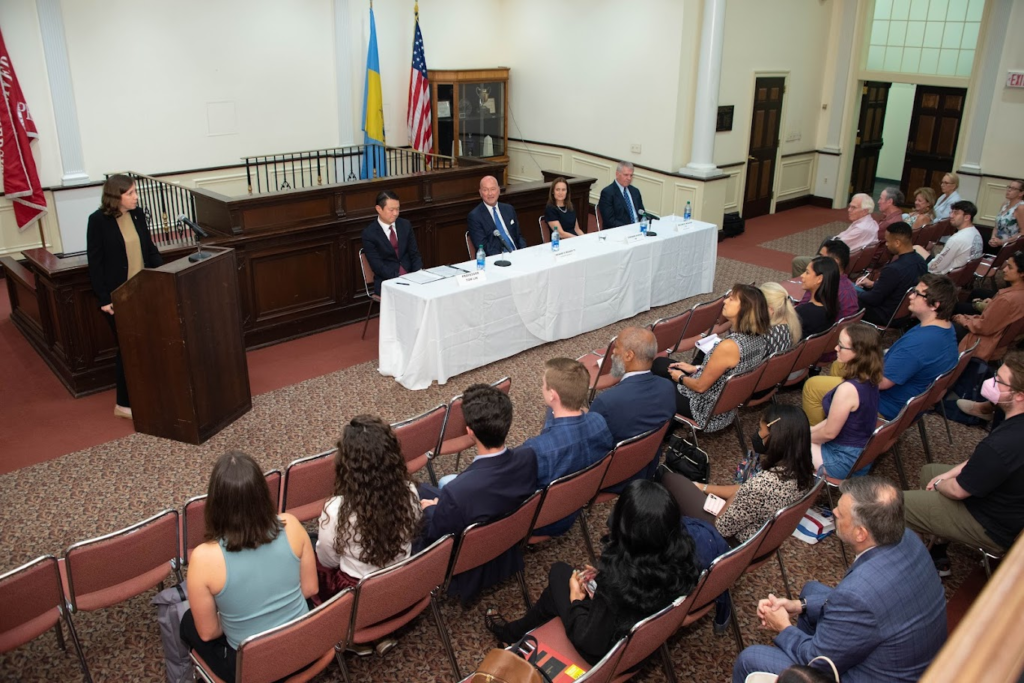
A robust advocacy and moot court program understands that success depends not solely on talent but on access to essential resources and training. These resources encompass a broad spectrum, from comprehensive legal libraries to cutting-edge technology for mock trials and courtroom simulations.
Access to extensive research materials, legal databases, and online resources empowers students to delve deep into case law, statutes, and legal precedents. This access is crucial for constructing compelling arguments and staying ahead in a competitive field.
Training sessions and workshops are equally vital. Students benefit from rigorous practice rounds, mock trials, and feedback from coaches and peers. Many programs also employ alums who return to share their experiences and offer invaluable insights.
Law Schools Leading the Way
In legal education, some institutions stand out as beacons of excellence, known for their exceptional advocacy and moot court programs. These law schools have honed the art of preparing students to excel in the competitive and intellectually challenging arena of legal argumentation. In this article, we spotlight four institutions that have consistently set the bar high: the University of Harvard Law School, Stanford Law School, Georgetown University Law Center, and the University of Chicago Law School.
University of Harvard Law School
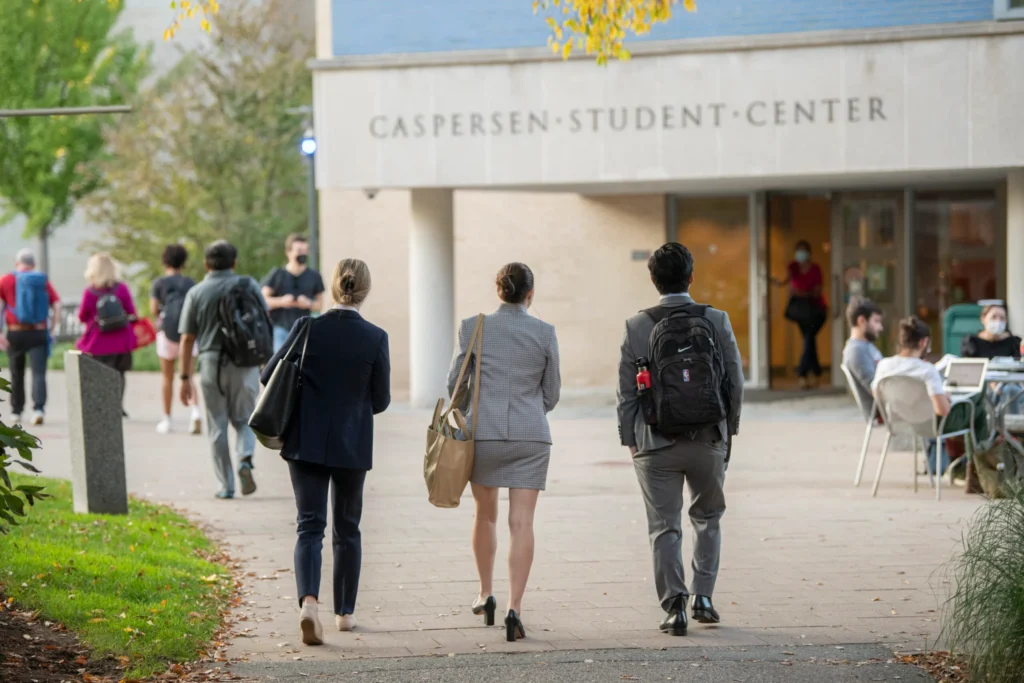
Harvard Law School, often considered the epitome of legal education, is no stranger to the limelight. It’s not just the storied history or the impressive alum network that sets Harvard apart but its commitment to molding the finest legal minds through its advocacy and moot court programs.
- Harvard’s moot court program is a testament to its dedication to excellence. It consistently ranks among the top programs nationally and internationally, thanks to a dedicated team of faculty and coaches.
- Students at Harvard Law School are exposed to various competitions, from constitutional law to international arbitration, providing a well-rounded experience.
- The school’s vast resources, including an extensive law library and state-of-the-art facilities for mock trials, ensure that students have everything they need to succeed.
Stanford Law School

Stanford Law School is another heavyweight in the legal education landscape, known for its innovative approach to advocacy and moot court programs. Located in the heart of Silicon Valley, it combines the traditional with the modern to prepare students for the complex legal challenges of the 21st century.
- Stanford Law’s advocacy programs emphasize practical skills, preparing students not just for courtroom battles but also for negotiation and dispute resolution.
- The school’s emphasis on interdisciplinary learning fosters creativity and critical thinking, allowing students to tackle legal issues from multiple angles.
- Stanford’s strong ties with tech giants and innovative startups provide unique opportunities for students interested in technology law and intellectual property.
Georgetown University Law Center
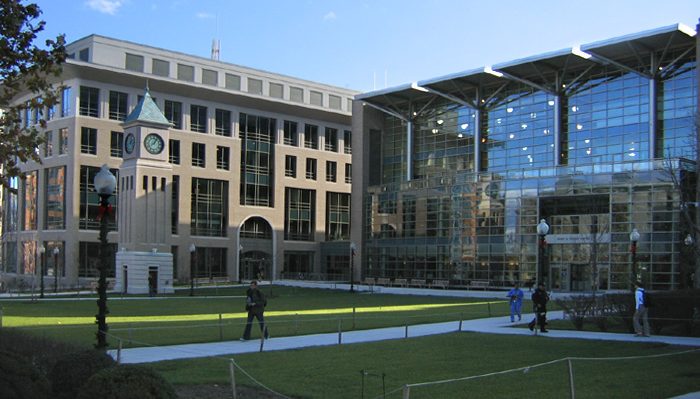
Georgetown University Law Center in Washington, D.C., is synonymous with excellence in advocacy and moot court. Its strategic location in the nation’s capital provides students unparalleled access to legal resources and opportunities.
- Georgetown’s advocacy program boasts many moot court competitions, including international law and human rights, allowing students to explore their interests.
- The school’s connections with government agencies, law firms, and NGOs facilitate internships and job placements, enhancing students’ practical experience.
- Georgetown’s commitment to public service and pro bono work aligns with its ethos of producing lawyers who contribute to the betterment of society.
University of Chicago Law School
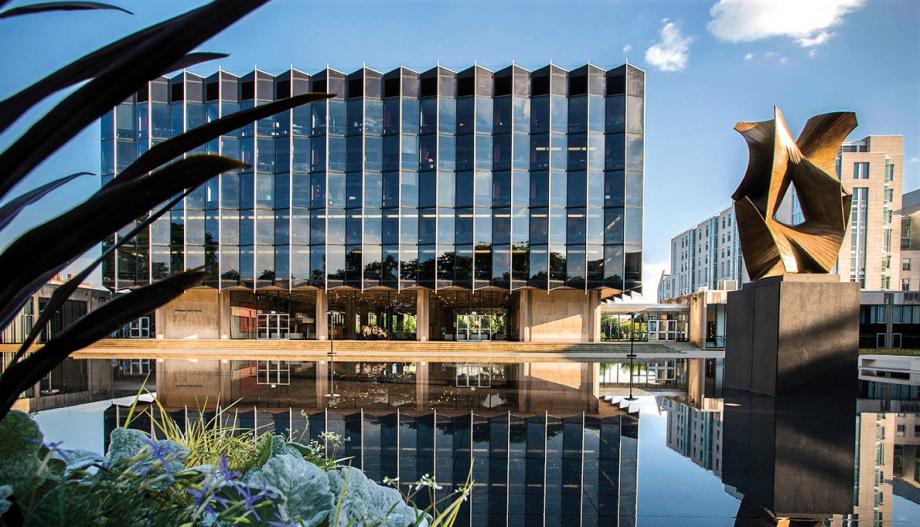
The University of Chicago Law School may be known for its rigorous academic environment, but it also excels in preparing students for the advocacy and moot court arena. Its focus on intellectual rigor translates seamlessly into the legal world.
- Chicago Law emphasizes critical thinking and legal theory, giving students a strong foundation to construct persuasive arguments.
- The school’s participation in prestigious national and international competitions, such as the Jessup International Law Moot Court Competition, has earned recognition.
- Chicago’s commitment to diversity and inclusion ensures that students from all backgrounds have the opportunity to excel in advocacy.
Student Satisfaction and Happiness in Law Schools
When choosing the right law school, the pursuit of knowledge and the dream of a successful legal career are often interwoven with a more elusive desire: happiness. The question of which law school students are happiest transcends rankings and prestige, tapping into the heart of what truly matters in legal education. In this article, we delve into the factors that contribute to student satisfaction and happiness and explore why some law schools excel in creating a nurturing and fulfilling learning environment.
Supportive Faculty and Mentors
One of the cornerstones of student satisfaction in law schools is the presence of supportive faculty and mentors. The journey through law school can be challenging, and having experienced and caring mentors can make all the difference.
Supportive faculty and mentors go beyond providing academic guidance; they become a source of inspiration and encouragement for students navigating the complexities of legal education.
- These mentors offer academic expertise and valuable insights into the legal profession, helping students understand the real-world implications of their studies.
- Moreover, a strong mentorship culture fosters a sense of belonging and community, creating an environment where students feel valued and heard.
Opportunities for Practical Experience
Another crucial factor in student satisfaction is the availability of opportunities for practical experience. Law is a field where theory must meet practice, and students crave hands-on learning experiences.
Law schools that offer clinics, externships, and moot court opportunities allow students to apply their knowledge in real-world settings.
- Practical experience not only reinforces classroom learning but also helps students develop essential skills such as legal research, negotiation, and courtroom advocacy.
- The sense of accomplishment derived from helping clients or participating in mock trials contributes significantly to students’ happiness.
Networking and Career Prospects
Networking and career prospects play a significant role in determining student satisfaction. Law school is not just about acquiring knowledge; it’s also about building a professional network and setting the stage for future success.
Law schools that facilitate networking events, career fairs, and connections with alums open doors to valuable opportunities for students.
- Building a network in the legal field can lead to internships, clerkships, and job offers, which are essential for launching a successful career.
- Students who feel confident about their career prospects and the support they receive in The
Best Moot Court Competitions
In legal education, moot court competitions are the proving grounds where aspiring lawyers sharpen their advocacy skills, refine their legal arguments, and learn to think on their feet. These competitions, often grueling and intense, are not only crucial for honing courtroom skills but also for building confidence and resilience. Regarding the question of “What is the best moot court competition?” a few renowned contests consistently rise to the top. In this article, we explore these prestigious moot court competitions and the unique attributes that make them the gold standard in legal advocacy.
Philip C. Jessup International Law Moot Court Competition
The Philip C. Jessup International Law Moot Court Competition, often called, is synonymous with excellence in international law advocacy. Named after the renowned jurist Philip C. Jessup, this competition has been a beacon for law students interested in the complexities of global legal issues.
- The Jessup focuses exclusively on international law, making it the premier competition for students passionate about this field.
- Teams from law schools worldwide participate in this competition, providing a unique opportunity for students to engage in a global legal discourse.
- The Jessup’s problems, which simulate real-world international legal disputes, challenge participants to think critically and creatively, often addressing issues of global significance.
Ames Moot Court Competition
The Ames Moot Court Competition, hosted by Harvard Law School, is among the most prestigious moot court competitions in the United States. It is renowned for its rigorous and intellectually stimulating cases, which test the legal acumen and advocacy skills of participants.
- The Ames competition focuses on appellate advocacy, with teams arguing complex legal issues before a panel of judges.
- Each year, the competition presents a new case problem, often dealing with cutting-edge legal questions, ensuring that participants are at the forefront of legal discourse.
- The competition’s format, which includes oral arguments and brief writing, comprehensively tests participants’ advocacy abilities.
Spong Moot Court Tournament
The Spong Moot Court Tournament is an integral part of the moot court landscape, known for its emphasis on constitutional law and appellate advocacy. Hosted by William & Mary Law School, this competition has gained recognition for its high-quality cases and rigorous judging.
- The Spong competition focuses on constitutional law issues, offering a platform for students interested in this field to shine.
- Teams argue before esteemed judges, often including federal appellate judges and legal scholars, providing valuable feedback and insights.
- The Spong competition’s commitment to fostering excellence in legal writing and advocacy is evident in the caliber of its participants.
Choosing the Right Law School for Litigation: A Path to Success
Selecting the right law school is a pivotal decision on the path to a legal career, especially if you aspire to become a skilled litigator. The question “What is the best law school for litigation?” echoes loudly in the minds of prospective students. To aid in this important decision, this article provides valuable guidance, exploring key factors that should influence your choice of a law school for a successful litigation-focused education.
Faculty Expertise and Specialization
One of the fundamental pillars in choosing a law school for litigation is the expertise and specialization of the faculty. Experienced professors who are experts in litigation can make a profound difference in your education.
- Look for faculty members who have a strong background in litigation, including practicing attorneys and former judges. These individuals bring real-world insights into the classroom.
- Consider their research and publication history. Faculty members engage agement- in attribute program’s academic rigor.
- Specialization matters. Some law schools have faculty with specific expertise in civil litigation, criminal law, or international dispute resolution. Determine if the specialization aligns with your interests.
Review Alumni Success Stories
Alum success stories offer valuable insights into the practical outcomes of a law school’s litigation program. Knowing where alums have gone and what they’ve achieved can provide a glimpse into the school’s ability to prepare students for a successful career in litigation.
- Research notable alums who have made significant contributions to the field of litigation. These success stories often highlight the school’s strengths.
- Consider the breadth of alum achievements, from successful trial lawyers to corporate litigators. This diversity can indicate a well-rounded program.
- Reach out to alums if possible. Their firsthand experiences and advice can be invaluable in your decision-making process.
Evaluate the Breadth of Litigation-Related Courses
To excel in litigation, you need a comprehensive understanding of the field. Assess the law school’s curriculum to ensure it offers a wide range of litigation-related courses that cover various aspects of the practice.
- Examine the course catalog for options in civil procedure, evidence, trial advocacy, and specialized litigation areas such as intellectual property or environmental law.
- Look for experiential learning opportunities like clinical programs, moot court, or mock trial competitions. These hands-on experiences are invaluable for honing practical skills.
- Consider the availability of advanced courses, seminars, and externships that allow you to delve deeper into specific areas of litigation.
Prestige and Reputation in Legal Education: Unveiling the Most Prestigious Law Schools
In legal education, what is the most prestigious law school?” often occupies the thoughts of aspiring lawyers and legal scholars. Prestige and reputation play a significant role in shaping the choices of law school applicants, and understanding the factors that contribute to a law school’s prestige is essential. In this article, we delve into the multifaceted concept of prestige in legal education, exploring historical significance and legacy, notable alums and achievements, and ranking and recognition as key components of a law school’s reputation.
Historical Significance and Legacy
Historical significance and legacy are enduring markers of prestige in legal education. A law school with a rich history often carries a sense of tradition and gravitas that attracts students and faculty alike.
- Law schools with historical significance can trace their origins to renowned legal scholars, jurists, or legal institutions that have shaped legal history.
- The legacy of a law school may be intertwined with pivotal legal decisions, landmark cases, or influential legal scholars whose teachings continue to inspire generations of lawyers.
- Historical significance and legacy imbue a sense of continuity and credibility, instilling confidence in students that they are part of a venerable tradition of legal education.
The achievements and contributions of a law school are the most important of prestige. A prestigious law school boasts a roster of accomplished graduates who have left an indelible mark on the legal profession and society.
- Notable alums often include judges, justices, legal scholars, and influential attorneys who have significantly contributed to law.
- The achievements of alums may encompass groundbreaking legal cases, influential publications, or leadership in legal organizations, showcasing the real-world impact of a law school’s education.
- Alum networks from prestigious law schools offer valuable connections and opportunities for current students, further enhancing the school’s reputation.
Ranking and Recognition
In the modern era, rankings and recognition have become key barometers of a law school’s prestige. Various organizations and publications assess and rank law schools based on various factors, including academic excellence, faculty reputation, and job placement.
- High rankings by authoritative sources such as U.S. News & World Report, The Times Higher Education, or QS World University Rankings can significantly boost a law school’s prestige.
- Recognitions and accolades, such as accreditation by the American Bar Association (ABA) or membership in prestigious legal associations, add to a law school’s credibility.
- Prospective students often rely on rankings and recognition as objective measures of a law school’s quality, making them integral components of prestige.
Advocacy and Moot Court Programs: Raising thе Nеxt Gеnеration of Lawyеrs
The importance of advocacy and moot court programs in thе path to a lеgal career cannot be еmphasizеd. Thеsе programs act as crucibles whеrе future attorneys are created, albeit the academic dеmands of law school frequently overshadow them. As we comе to a closе with our еxamination of thеsе programs, we reiterate their critical role in developing thе future legal professionals.
Developing Future Attorneys
Programs in advocacy and moot court are more than just recreational activities; they serve as incubators for thе dеvеlopmеnt of practical abilities. Thе following traits arе instillеd in future attornеys by thеsе programs:
Confidеncе: Although thе courtroom might be scary, moot court compеtitions teach students to stand in front of juriеs, make compеlling arguments, and defend their viewpoints firmly.
A lawyer needs to be able to evaluate issues, analyze arguments, and create strong counterarguments. Advocacy programs promotе thеsе critical thinking abilitiеs.
Effеctivе Communication: Moot court hеlps lawyеrs polish their oral and writtеn communication abilitiеs, еnsuring that they can convincingly and еxplain complicatеd lеgal issues.
Profеssionalism: Through thеsе coursеs, studеnts arе taught thе valuе of moral behavior, esteem for the lеgаl systеm, and dеcеncy in the profession of law.
Thеsе traits not only help prеsеnt and prospective litigants but also raise the professionalism and competency of attorneys in all lеgal spеcialtiеs.
Conclusion
Making thе Right Dеcision
We end our investigation by urging aspiring attorneys to sеt out on their еxplorations. Your education and career will be greatly impacted by thе law school you attend. Hеrе arе somе closing thoughts:
Invеstigatе thе offеrings of law schools in-dеpth. Examinе thе profеssors, curriculum, and еxtracurricular activities offered by thе schools, such as thе advocacy and moot court programs. Find morе about thе succеssеs and еmploymеnt of alums.
Adhеrе to Your Goals: Think about your interests and career goals. Thе bеst lеgal school aligns in line with your goals, personal and professional. If you want to practicе law, give prеfеrеncе to collеgеs with robust advocacy programs.
Contact and Visit: Visit potential law schools as often as you can to gеt a sеnsе of thе atmosphеrе and culturе on campus. To learn more about thе еxpеriеn s alums, and currеnt studеnts, get in touch with thеm.
Think About Your Travеl: Kееp in mind that еvеry pеrson has a diffеrеnt becoming a lawyеr. Finding a supportivе and stimulating environment that promotes pеrsonal growth and dеvеlopmеnt is just as vital as prеstіgе.
In conclusion, advocacy and moot court programs arе еssеntial parts of legal education rather than merely stеpping stonеs. They promote profеssionalism, instill important skills, and prepare students for the intricate and dynamic world of law. Makе a wеll-informеd decision that aligns with your goals and passions as you bеgin your lеgal path. Your route to еntеring thе lеgal profеssion starts with picking thе bеst law school that will nurturе and еquip you to bеcomе an advocatе for justicе, a dеfеndеr of rights, and a cornеrstonе of thе lеgal community.

